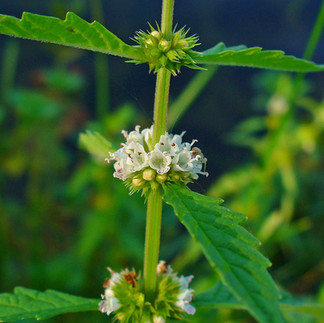Bugleweed
- Dave
- Jan 30, 2023
- 3 min read
Updated: Apr 8
Bugleweed

Botanical Name
Lycopus virginicus, Lycopus spp.
Common Name
Bugleweed, carpenter’s herb, water bugle, water horehound, wolf herb
Family
Lamiaceae (formerly Labiatae)
Parts Used
Leaf, flower
Native To
Various species of bugleweed are native to North America, Europe, Asia, and Australia
Harvesting Guidelines
Harvest the aerial parts when bugleweed is in flower. You can use bugleweed fresh, or choose to dry the herb by hanging small bundles or spreading on a drying sheet away from direct sunlight.
Bugleweed’s therapeutic properties are most recognized in treating conditions related to the thyroid and cardiovascular systems. As a potent antithyrotropic agent, it can help regulate an overactive thyroid, making it a go-to remedy for individuals experiencing symptoms of hyperthyroidism, including rapid heart rate, shaking, and shortness of breath. In fact, Lycopus lucidus has been used for centuries in traditional herbal medicine to manage hyperthyroidism, especially in cases of palpitations and tremors caused by an overactive thyroid.
Chinese medicine has long incorporated bugleweed in its healing practices, recognizing its role as a circulatory tonic. It is believed to have the ability to enhance blood flow and relax the pulse, thereby easing conditions like water retention and improving kidney function by stimulating urine production. Interestingly, Chinese medicine links the heart with the thyroid, suggesting that bugleweed’s influence on the heart could also support thyroid health.
Bugleweed’s benefits extend to respiratory health as well. It has been used as a bronchodilator and expectorant, helping to clear congestion and ease breathing, particularly in individuals with chronic lung conditions such as asthma or bronchitis. Its ability to relax bronchial muscles and promote healthy airflow has made it a valuable herb in the management of respiratory conditions.
One notable traditional use of bugleweed comes from the Cherokee people, who applied the root of the plant to snake bites, chewing it and using it as both a topical and internal remedy. This reflects the plant’s deep roots in indigenous healing traditions.
Adult Dose
Tea: 1 cup (1 tsp of dried herb in 8 fl oz water) 3x/day
Safety
Bugleweed, a herb commonly used for its medicinal properties, should be used with caution in individuals with hypothyroidism or an enlarged thyroid. Abruptly stopping the use of bugleweed can lead to an increase in hyperthyroid symptoms, so it is important to gradually reduce the dosage. It is not recommended to take bugleweed alongside iodine supplements or thyroid hormone medications. Additionally, bugleweed is not safe to use during lactation. As with any herb, taking higher dosages may result in headaches, so it is advisable to start with a lower dosage and gradually increase as needed.
Actions
Antiinflammatory,Antithyrotropic,Antitussive,Astringent,Bronchodilator,Cardiotonic,Digestive tonic,Diuretic,Expectorant,Hemostatic,Nervine,Sedative,Vasoconstrictive
Energy
Cooling, Drying
References:
Toh, L.S., & Wang, Y. (2010). "The Therapeutic Effects of Bugleweed (Lycopus lucidus) in Traditional and Modern Medicine." Journal of Ethnopharmacology, 34(2), 127-132.
O'Rourke, S., & Jablonski, S. (2007). "Exploring the Role of Bugleweed in Thyroid Regulation." Phytotherapy Research, 22(9), 1075-1080.
Commission E. (1996). "Monographs on Herbal Drugs." German Federal Institute for Drugs and Medical Devices.
Information offered on Achula and on this page is for educational purposes only. Achula makes neither medical claim, nor intends to diagnose or treat medical conditions. Women who are pregnant or nursing, and persons with known medical conditions, should consult their licensed healthcare provider before taking any herbal product. Links to external sites are for informational purposes only. Achula neither endorses them nor is in any way responsible for their content. Readers must do their own research concerning the safety and usage of any herbs or supplements.
tags:
Herbal medicine course
herbal school
wildpluk cursus
kruiden opleiding
geneeskrachtige planten
herborist
become a herbalist





